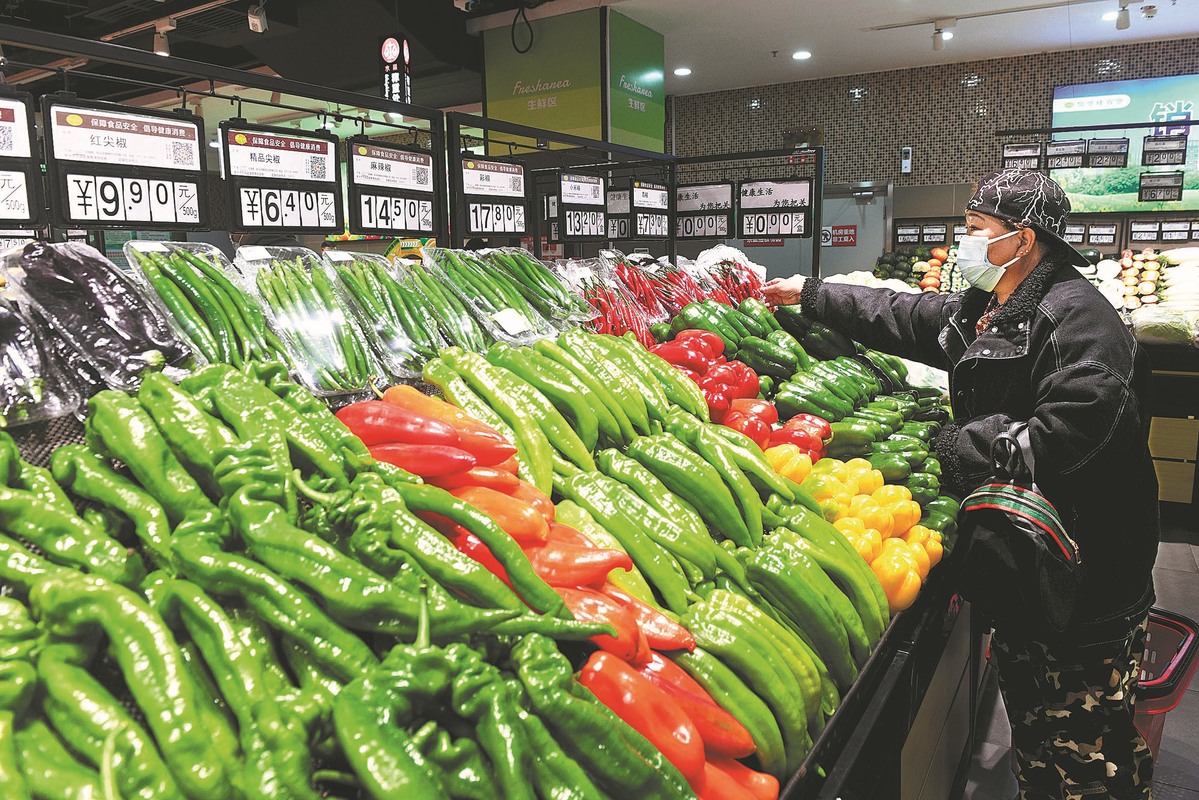
專家表示,中國經(jīng)濟(jì)的復(fù)蘇預(yù)計將為全球通脹降溫,而不是推高通脹。中國通脹率保持在溫和水平,將為抑制全球飆升的通脹發(fā)揮關(guān)鍵作用,同時也將確保今年強(qiáng)勁的復(fù)蘇勁頭和穩(wěn)定的物價。

A consumer picks vegetables at a supermarket in Shijiazhuang, Hebei province, on Feb 10. [PHOTO by JIA MINJIE/FOR CHINA DAILY]
The recovery of the Chinese economy is expected to cool global inflation instead of pushing it up, and China's inflation growth and overall prices will remain tame and stable, according to economists and analysts.
經(jīng)濟(jì)學(xué)家和分析師表示,中國經(jīng)濟(jì)的復(fù)蘇預(yù)計將為全球通脹降溫,而不是推高通脹。中國的通脹增速和物價總體水平將保持穩(wěn)定。
Robin Xing, Morgan Stanley's chief China economist, said China's reopening will help curb surging global inflation, as the normalization of economic activities will stabilize supply chains and make them function more effectively. He added that will avoid the supply shock related to global supply, one of the drivers of inflation.
摩根士丹利中國首席經(jīng)濟(jì)學(xué)家邢自強(qiáng)表示,中國的重新開放將有助于遏制全球通脹飆升,因為經(jīng)濟(jì)活動的正常化將穩(wěn)定供應(yīng)鏈,使其更有效地運(yùn)作。他補(bǔ)充說,這將避免出現(xiàn)與全球供應(yīng)相關(guān)的供應(yīng)沖擊,這是通貨膨脹的驅(qū)動因素之一。
Over the past year, many economies around the globe witnessed the biggest surge in inflation in 40 years due to runaway energy and food prices amid geopolitical tensions and massive fiscal and monetary stimulus that many countries adopted.
過去一年,由于地緣政治緊張局勢和許多國家采取大規(guī)模財政和貨幣刺激措施,能源和食品價格上升,全球許多經(jīng)濟(jì)體經(jīng)歷了40年來最大的通脹飆升。
Against that background, China, the world's second-largest economy, has managed to deal with inflationary pressures with the government's effective measures to stabilize prices and supplies of daily necessities and bulk commodities.
在此背景下,全球第二大經(jīng)濟(jì)體中國通過采取有效措施,穩(wěn)定生活必需品和大宗商品的價格和供應(yīng),成功應(yīng)對了通貨膨脹壓力。
The country's consumer price index, a main gauge of inflation, rose by 2 percent year-on-year in 2022, well below the country's annual inflation target of around 3 percent, according to the National Bureau of Statistics.
據(jù)國家統(tǒng)計局?jǐn)?shù)據(jù)顯示,2022年,我國居民消費(fèi)價格指數(shù)(通貨膨脹的主要衡量指標(biāo))同比上漲2%,遠(yuǎn)低于我國3%左右的年度通脹目標(biāo)。
Looking into the full year, Xing said he believes inflation will not be a major concern for China in 2023 and the country will keep overall prices stable within a reasonable range.
邢自強(qiáng)表示,展望全年,他認(rèn)為通脹不會成為中國的主要問題,中國的物價總體水平將穩(wěn)定在合理區(qū)間。
When it comes to concerns that the revival of the world's second-largest economy may push up global commodity prices, Xing said China's economic rebound will mainly be driven by consumption rather than forceful infrastructure spending.
在談到中國的經(jīng)濟(jì)復(fù)蘇可能推高全球大宗商品價格的擔(dān)憂時,邢自強(qiáng)說,中國經(jīng)濟(jì)的反彈將主要由消費(fèi)推動,而不是大量的基礎(chǔ)設(shè)施建設(shè)支出。
"That means China's reopening will not boost inflation via commodities, especially as the United States and Europe may suffer from weak demand this year," he said.
他說:“這意味著中國的重新開放不會通過大宗商品價格推高通脹,尤其是在美國和歐洲今年可能遭遇需求疲軟的情況下。”
Considering China's abundant labor force and their strong willingness to dedicate their efforts to work, Xing said the recovery in consumption of services will not add too many inflationary pressures.
邢自強(qiáng)表示,考慮到中國充足的勞動力及其強(qiáng)烈的就業(yè)意愿,服務(wù)消費(fèi)行業(yè)的復(fù)蘇不會增加太多的通脹壓力。
Despite a strong recovery of mobility and in-person service sectors in the second half of January, China continued to print low inflation data. In January, China's CPI increased by 2.1 percent from a year earlier. Meanwhile, CPI in the US climbed 6.4 percent in January.
盡管今年1月下旬,中國人口流動性大增,服務(wù)業(yè)出現(xiàn)了強(qiáng)勁復(fù)蘇,但通脹數(shù)據(jù)仍處于低位。今年1月,中國的居民消費(fèi)價格指數(shù)同比增長2.1%,而同期美國居民消費(fèi)價格指數(shù)同比上漲6.4%。
Lu Ting, chief China economist at Nomura, said the uptick in year-on-year CPI inflation was mainly driven by the timing of the Chinese New Year holiday, which took place in January this year and February last year.
野村證券首席中國經(jīng)濟(jì)學(xué)家陸挺表示,居民消費(fèi)價格指數(shù)同比上漲主要是受到中國春節(jié)假期時間的影響,今年春節(jié)假期在1月,去年在2月。
Looking forward, he said his team expects China's CPI inflation to edge down marginally to 2 percent in February, reflecting some pullback after the January Spring Festival holiday effects.
展望未來,陸挺表示,他的團(tuán)隊預(yù)計中國2月份的居民消費(fèi)價格指數(shù)將小幅下降至2%,反映出1月份春節(jié)假期影響后的一些回落。
來源:中國日報
編輯:yaning
